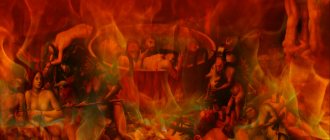Where does this phrase come from: “do not make yourself an idol”
These words are found in chapter 20 of the book of Exodus.
Who said so
“You shall not make for yourself any graven image” are the words addressed by God to His people after He led them out of Egypt. The Creator's great goal was to create the purest people on earth. For this purpose He gave the Jews commandments .
In the desert Moses , the leader of the Israelites, climbed Mount Sinai, where he stayed for 40 days, after which he descended with two stone tablets. The 10 commandments were written on them by the hand of God. They contained a ban on the creation of idols.
The meaning of phraseology
An idol is any object, phenomenon or creature that a person turns into an idol. God forbids the creation of other gods, the depiction of them and the worship of them.
Full text of the commandment
You shall not make for yourself an idol or any likeness of anything that is in heaven above, or that is on the earth below, or that is in the water under the earth;
You shall not bow down to them or serve them, for I am the Lord your God, a jealous God, visiting the iniquity of the fathers on the children to the third and fourth generation of those who hate Me,
and showing mercy to a thousand generations of those who love Me and keep My commandments.
(Ex.20:4-6)
What is this commandment and how to understand it
The commandment prohibiting the creation of idols and the worship of them is the second of ten. To understand it correctly, it is important to examine how the prohibition of idolatry was understood in ancient times.
Some consider it idolatry to pay any respect to a person or event that is not associated with Christianity. For example, in their opinion, on Cosmonautics Day people worship Yuri Gagarin and other cosmonauts, on Teacher’s Day - the teacher, and so on. Of course, this is an extreme view.
On the occasion of the first man's flight into space, N. S. Khrushchev organized a reception in the Kremlin. He also invited Patriarch Alexy I there. The first secretary of the CPSU devoted an important place in his speech to the propaganda of atheism. Attacks against faith provoked, unfortunately, a strong positive reaction. But they were interrupted... by simple proof of the inconsistency of atheistic propaganda in Russia. A certain woman approached His Holiness and took a blessing. How dare you, who allowed it? With all the desire, it was impossible to prevent it. This was the mother of the first cosmonaut Yuri Gagarin. Thus, a simple woman showed the communist leaders the futility of their efforts to fight the Church.
The Bible calls us:
Honor everyone, love the brotherhood, fear God, honor the king.
(1 Peter 2:17)
Composition of the Bible
The Bible consists of the Old and New Testaments
- The Old Testament is the first part of the Christian Bible, the common sacred text of Judaism and Christianity. Consists of the Pentateuch (Genesis, Exodus, Leviticus, Numbers, Deuteronomy); thirteen historical books, including the Book of Joshua, the Book of Judges of Israel, the First Book of Ezra; the seven books of the sages, including the Book of Proverbs of Solomon, the Book of Ecclesiastes, or Preacher, the Book of Song of Songs of Solomon; nineteen books of the prophets, including the Book of the Prophet Ezekiel, the Book of Lamentations of Jeremiah, the Message of Jeremiah; eight other books, including the Book of Esther, First, Second, Third Book of Maccabees.
- The New Testament is the second part of the Christian Bible, consists of twenty-seven books: four Gospels (Matthew, Mark, Luke, John); Acts of the Holy Apostles; twenty-one epistles, including the Epistle of James, the First, Second Epistle of Peter, the First, Second, Third Epistle of John; Revelations of John the Theologian
Don’t make an idol for yourself From small little things, From the furnishings and apartment, From visits to doctors, From Sunday and Saturday, From thoughts about fate. After all, it’s not our age to allow ourselves to become despondent.Do not create an idol for yourself, Waging everyday battles, From the inevitable and dull Calculations of your profits. And maybe you've walked halfway around the world in search of your happiness... Don't make an idol for yourself, neither from yourself nor from him.
Do not make yourself an idol From the memory of your land, From those fighters and commanders who did not achieve victory. From the truths, choose the simple ones, That are not subject to the times, And create Russia for yourself, Just as she created us! (Yu. Vizbor)
Interpretation of the biblical commandment given to Moses
What does it mean not to create idols for yourself and not to worship them? What is the difference between idolatry and respect?
Nicolas Poussin. Worship of the golden calf. 1633–1634
God does not accept the worship of a creation instead of the Creator, who is He alone, even if idols represent Him:
Hold firmly in your souls that you did not see any image in the day when the Lord spoke to you at [Mount] Horeb from the midst of the fire,
lest you become corrupt and make for yourselves graven images, images of any idol representing a man or a woman,
images of any livestock that is on the earth, images of any winged bird that flies under the heavens,
images of some [reptile] crawling on the ground, images of some fish that are in the waters below the earth;
and lest, when you look up to heaven and see the sun, the moon, and the stars [and] all the host of heaven, you are deceived and worship them and serve them, since the Lord your God has allocated them to all the nations under the whole heaven.
(Deut. 4:15-19)
Why you can't have an idol
It would seem that what is wrong with people giving divine honors to someone else other than the true God? The commandment is important for the following reasons:
- Idolatry offends God just as adultery offends a husband. The Lord is jealous. Exclusive devotion to someone else crowds out love for the Creator from the heart.
- Worshiping idols is dishonest because it steals glory from the Creator, who alone is the source of the existence of the Universe, the Earth, and human talents and abilities.
- Many idols are created in the image and likeness of man in order to justify his sinful behavior. Thus, Zeus is a famous adulterer, and the sophisticated Apollo is capable of incredible cruelty.
- Idolatry presents God in a distorted, humiliating light : as a being limited in time, space, knowledge and abilities. But the Creator is above all creation and is not limited by its physical laws. If God is not omniscient, not eternal and not omnipotent, then why should we obey Him in everything? Doesn't His limitations mean He can make mistakes?
- The deification of a person is far from love, since it makes his admirers blind . A blind admirer does not see the shortcomings of the object of veneration, which leads to the same mistakes that his god makes.
- Idols do not save from sin, old age and death.
Our God is in heaven and on earth; does whatever he wants.
And their idols are silver and gold, the work of human hands.
They have lips, but they do not speak; They have eyes, but they do not see;
They have ears, but they do not hear; They have nostrils, but they do not smell;
They have hands, but they cannot touch; They have legs, but they don’t walk; and they do not utter a voice with their throat.
Let those who make them and all who trust in them be like them.
House of Israel! trust in the Lord: He is our help and shield.
House of Aaron! trust in the Lord: He is our help and shield.
Those who fear the Lord! Trust in the Lord: He is our help and shield.
(Ps. 113:11-19)
Afterword
Everything is good in moderation. Idols are necessary and useful, but only as approximate guidelines. You can admire them, but you need to compare their individual characteristics with your own individual psychological and personal characteristics. And under no circumstances should you copy another person. You are unique, you are an individual. The main goal of a person’s life is to reveal one’s potential. Worship and fanaticism are dangerous for both the fanatics and the idols. And disappointment and frustration caused by the realization that all people are imperfect is the least of the possible consequences.
Examples of idols: ancient and modern
To properly understand the second commandment, we must remember that it was given to Jews who grew up in Egyptian culture.
Idols of Egypt
There were a huge number of gods in Egypt. In addition to the main pantheon, almost every village, city or nome (administrative center) had its own gods.
Ra is a pan-Egyptian god, the main god of the Egyptian pantheon. He was considered the Solar deity, the god of all things, the lord of infinity. Depicted with the head of a falcon, crowned with a solar disk.
The Egyptians worshiped the earth, sky, sun, stars, rivers, trees, animals and other creations of God. For them it was all gods. However, as the French Egyptologist Mariette , the head of all Egyptian gods was God - immortal, uncreated, invisible and hidden from ordinary mortals. He was considered the Creator of heaven and earth, of all things, and nothing was born without him.
This God existed exclusively for the Egyptian priests initiated into the sacrament of the sanctuary. But behind its walls, he received, according to the Egyptians, thousands of images that were perceived by ordinary people as gods. In Egypt there were not even rules according to which the gods had to be depicted in any single way. The same deity could be depicted as an animal, a man with the head of an animal, or simply a man.
However, for all the enormity of idolatry, the Egyptians did not forget one thing:
The countless number of gods that the Egyptians worshiped could not completely erase in them the concept of the highest and only deity, which, no matter what name it was called, the sacred myths define it everywhere with the same expressions, leaving not the slightest doubt that it there is precisely this supreme and unified being.
Y. Ivannikov “Ancient Egypt: culture and mythology.”
The Bible reference book by Henry Halley provides evidence that after the flood, all over the earth people worshiped the true God, but soon fell into idolatry, deifying creation.
The Israelis, who stayed in Egypt for hundreds of years, absorbed its great culture, along with its advantages and disadvantages. Therefore, they easily made themselves a golden calf and named it Yahweh.
Rafael Santi. Worship of the Golden Calf
Yes, for them the idol was an image of the true God and they worshiped it as Yahweh. But God did not appreciate their zealous impulse. Those who worshiped the golden calf perished.
Interesting fact
The fact that the Israelites made a golden calf before they heard the 10 Commandments was not a mitigating circumstance.
Abraham, Isaac, Jacob, Joseph and other faithful ancestors of the Jews who came out of Egypt did not worship idols and taught devotion to Yahweh to their descendants.
The entire Old Testament speaks about the sin of worshiping images of various deities. The Jews learned the hard way how catastrophic the consequences of idolatry were. They became worse than the pagan peoples around them.
[Israel] has acted more wickedly against My statutes than the heathen, and against My statutes worse than the lands around them; for they have rejected My statutes and do not walk in My statutes.
Therefore thus says the Lord God: Because you have multiplied your iniquities more than the Gentiles who are around you, you do not walk in My statutes and do not fulfill My statutes, and you do not even walk in accordance with the statutes of the Gentiles who are around you -
Therefore thus says the Lord God: Behold, I am against you, even I myself, and I will bring judgment among you before the eyes of the Gentiles.
(Ezek.5:6-8)
After returning from Babylonian captivity, the Israeli people as a whole did not worship idols. But this does not mean that they did not have false deities. In the first century, Jewish leaders rejected Christ for personal power, fame, and wealth. Personal ambitions, the thirst for comfort and endless pleasures are idols even now.
How to determine whether a person is sick with fanaticism?
In the medical reference book, under the item “Classification of mental disorders,” there is a paragraph in which fanaticism (idolatry) is highlighted as a “mental” disease.
Signs of idolatry:
a person’s depressive state as a result of negative or joyful events in the life of an ideal (idol). A young man gets sick if his role model loses a football match. A living idol has found love - the girl becomes hysterical and stops going to school and work. When an idol disappears from the sight of a fan, the first one may commit suicide. This form of imitation is the most difficult. the imitator spends all his money on purchasing the idol’s paraphernalia: announcements, photographs, clothes, symbolic badges. He tries to be where his idol might be at the moment. Watches all TV shows with his participation.
the object of imitation becomes the “cornerstone” for the fan’s thoughts, deeds, and conversations. A person begins to call, write, and meet his pet at home. there is a narrowing or disappearance of the circle of interests. A teenager suffering from mental illness stops studying, working, reading, and abandons entertainment that once brought joy. aggressive behavior towards friends and acquaintances who allow themselves to make humiliating remarks towards their favorite hero. a fanatical worshiper rejects negative actions from the object of worship. Negative information about a living idol is perceived as implausible.
Severe types of fanaticism are rare. The phenomenon of idolatry occurs in teenagers, which over the years turns into a pleasant memory. Another outcome is a persistent attachment to the object for life without signs of mental disorders. It rarely comes to the extreme measure of taking one's own life.










